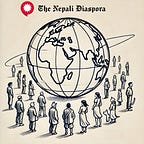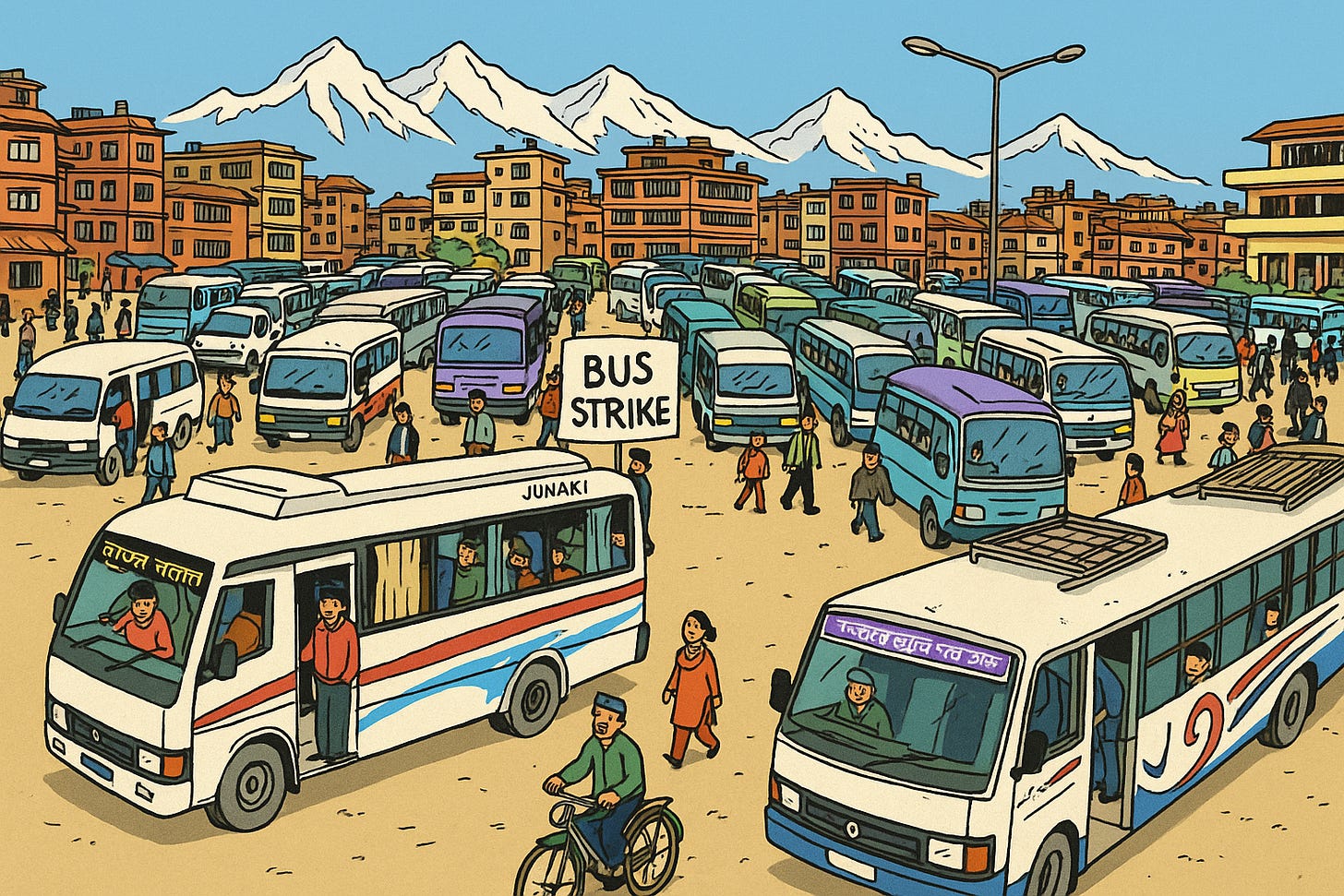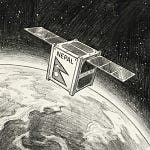Share the love! Help others that care about Nepal stay up to date the easy way. If you like this issue, share it with a friend who follows Nepal and hit Subscribe for your weekly dose of curated, can’t-miss updates.
Transport screeched to a halt and corruption scandals surged forward this week in Nepal. As the nationwide strike stranded thousands and exposed tensions over ride-sharing, a historic graft case saw a former prime minister and senior lawmakers face court. With World Bank funds flowing in and trade booming, not all the headlines were grim — and the global Nepali community is making fresh moves too. Let’s dive in!
Social & Cultural ⭐
Nepal’s recent nationwide transport strike brought daily life to a standstill, disrupting mobility and sparking fierce debate over new ride-sharing regulations. The strike, triggered by the Gandaki Province’s move to allow private vehicles to operate commercially, left streets eerily empty and commuters stranded across major cities. After intense protests and public outcry, the provincial government suspended the rule for one month, as reported by KTM Post. The Supreme Court also intervened, issuing an interim order against such strikes for infringing on citizens’ rights to movement, according to THT, while the National Human Rights Commission urged transport operators to adopt protest methods that do not block essential services.
The strike’s human impact was significant: travellers, including migrant workers and medical patients, were left stranded for days without access to public transport. Ride-hailing apps like Pathao and Indrive surged in usage but also drew criticism for price hikes amid the shutdown. According to KTM Post, many returnees from India were caught unaware of the strike and faced dire situations at border towns and bus parks. The strike also exposed tensions between federal and provincial authorities, with the federal government requesting a pause on the provincial regulation, while consumer rights groups condemned the government's perceived capitulation to transport syndicates. Though the strike has been called off, underlying debates around regulation of Nepal’s fast-evolving ride-hailing sector remain far from resolved.
While the nation was grappling with these disruptions, Nepal marked its National Day for the Elimination of Caste Discrimination and Untouchability. President Paudel called on all Nepalis to actively stand against caste-based discrimination and foster an inclusive society, reports TRN. Vice President Yadav emphasised the need for both legal enforcement and deeper social transformation. Civil society leaders and parliamentarians echoed these calls, reminding the public that while legal progress has been made, changing entrenched social attitudes requires continued commitment.
In other developments, Kathmandu is racing to prepare for an early monsoon, with road repairs to the Bancharedanda landfill and river dredging underway to prevent seasonal flooding, according to KTM Post. Over 17,000 security personnel have been mobilised nationwide for monsoon disaster response. Meanwhile, census data reveals a gradual decline in the Hindu population’s share, with growth among other faiths—an indicator of Nepal’s evolving religious landscape, reports Republica. On a positive note, Bhaktapur Hospital was again named Nepal’s best hospital by THT, and Nepal’s national football team heads to Hong Kong this week, buoyed by high-altitude training in Manang, as they aim to qualify for the 2027 Asian Cup.
Politics & Governance 🪧
In a landmark move, Nepal’s anti-corruption watchdog has filed charges against former Prime Minister Madhav Kumar Nepal and 92 others in connection with the Patanjali land scam—the first time in the country’s history that a former head of government faces prosecution for corruption. The Commission for the Investigation of Abuse of Authority (CIAA) accuses Nepal of misusing authority to exempt land from ceiling limits, enabling irregular sales that cost the state millions, reports THT. The case also targets senior bureaucrats, ministers, land officials and bank executives, signalling a broadening crackdown. Nepal denies wrongdoing and alleges political vendetta by Prime Minister Oli, according to Republica.
The scandal is part of a deepening corruption crisis engulfing Nepal’s political class. Four sitting lawmakers are now suspended—Nepal joins Rabi Lamichhane, Mohan Basnet and Top Bahadur Rayamajhi—while others face serious fraud allegations, reports THT. The Supreme Court has also ordered a criminal investigation into Maoist Vice-chair Agni Sapkota over a 2005 murder case, adding further pressure on senior political figures. Meanwhile, opposition parties have blocked parliamentary proceedings over a visit visa scam implicating Home Minister Ramesh Lekhak, forcing repeated House adjournments, as reported by KTM Post.
The widening net of corruption cases has fuelled public frustration with both government and opposition parties, with critics accusing the political elite of fostering a culture of impunity. Observers note that while the CIAA’s move against a former prime minister marks a major shift—it had previously been accused of sparing high-profile figures—questions remain about selective enforcement and political motives. The agency’s sweeping charge sheet in the Patanjali case and simultaneous cases against sitting MPs reflect a growing crisis of parliamentary integrity, with Republica noting that multiple lawmakers elected in 2022 are now suspended or facing serious legal challenges.
Against this backdrop of legal turmoil and political deadlock, street politics is heating up. Pro-monarchy and pro-Hindu groups, led by a fractured royalist camp, are planning to decentralise their protests after turnout fell and leadership rifts widened, according to KTM Post. Congress and Maoist leaders, in turn, are staging mass rallies to defend the republican system. CPN (Maoist Centre) Chair Pushpa Kamal Dahal stressed that the republic is a collective achievement, not solely a Maoist legacy, reports THT, while Congress prepares district-wide gatherings in response to what it calls a calculated monarchist push. With political tensions high and governance stalled, Nepal’s democracy faces one of its most turbulent periods in recent years.
Economy & Development 💸
Nepal secured fresh development financing this week, with the World Bank approving $257 million in loans to improve electricity distribution and irrigation services. The Electricity Supply Reliability Improvement Project will modernise networks in four provinces, while an irrigation upgrade in Kailali will boost year-round farming for 160,000 people, reports THT. The WB also outlined a new seven-year Country Partnership Framework targeting job creation, connectivity, and climate resilience, aiming to channel up to $2.7 billion into Nepal’s growth agenda, according to TRN.
Trade through Birgunj surged past Rs 500 billion this fiscal year, with exports — especially refined soybean oil — up over 210%, reports Republica. To cope with rising demand, a long-awaited Rs 397 million expansion of Sirsiya Dry Port is finally underway, with World Bank support, reports KTM Post. Business leaders hope this will ease congestion and improve Nepal’s trade efficiency as regional commerce grows.
Meanwhile, Nepal’s urban population has grown by 10% in a decade, but infrastructure often lags behind, raising concerns about sustainability, reports Republica. Tourism investment remains strong, with an 18% rise in star-rated hotels this year, though May tourist arrivals dipped slightly, according to TRN. The government is also planning an Alternative Development Finance Mobilisation Fund to help finance large projects amid fiscal strain, and digital payments platform eSewa has entered the hotel booking space, reflecting growing fintech innovation.
Diaspora & Globalization 🌏
Nepal’s global diaspora continues to make its mark, with leaders launching Momo VC, a US-based venture capital firm aimed at backing startups in AI, fintech, biotech, and sustainability sectors. The fund, co-founded by Preeti Adhikary and Sajan Gautam, also aims to foster a supportive community for founders, reports Republica. However, policy shifts back home have sparked frustration among Non-Resident Nepalis (NRNs), as a new law mandates that NRN citizenship holders renew their visas every two years — contradicting earlier government promises of a 10-year free visa, according to Republica. Meanwhile, Nepali students are facing uncertainty as the US tightens student visa rules, prompting many to reconsider their plans or seek alternative destinations, reports KTM Post.
Did you know ❓
Nepal now has more than 44 million active mobile SIM cards — well above its total population.
Let’s connect
Enjoying this issue? 📩 Share it with a friend & let’s keep Nepalis worldwide in the loop! Got thoughts? Hit reply—we’re all ears! Or let us know what you think via our Feedback form or follow us on Facebook | LinkedIn
P.S. Got a story or issue you'd like us to cover next week? Drop us a reply — we're building this space together.
About Nepali Diaspora Digest:
The Nepali Diaspora Digest connects the global Nepali community with curated news, insights, and stories that matter most. Join us as we celebrate and explore the diverse voices and achievements of Nepalis worldwide.
Partner shout out
belayat.uk: helping Nepalis connect in the UK on jobs, housing, events and finding local Nepali owned businesses













